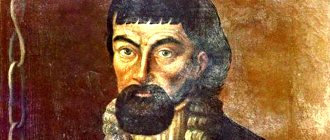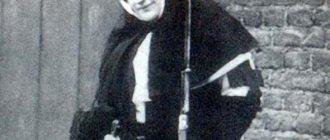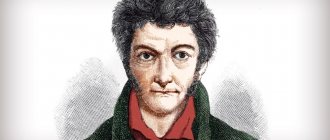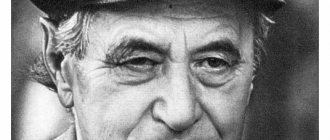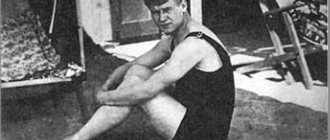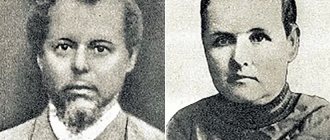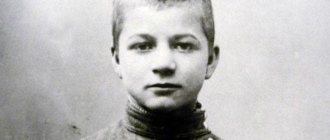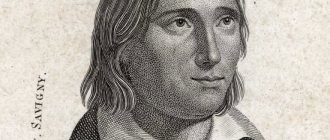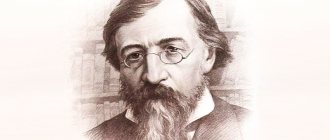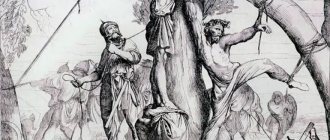Childhood and youth
Boris was born on August 30, 1882. This happened in the city of Veliky Novgorod. The boy became the second child in the family - the first was daughter Vera. Boris's father, Stepan Vasilyevich, was a teacher at the Novgorod Teachers' Institute. Using Stepan Vasilyevich's textbooks, several generations of children studied arithmetic, algebra and geometry. The boy’s mother, Tatyana Pavlovna, was a popular pianist, a student of the Russian composer Anton Grigorievich Rubinstein.
Portrait of Boris Zhitkov
Because of his Jewish roots, Stepan Vasilyevich was closely watched by people from government agencies. Therefore, when, after the birth of the future writer, a conflict arose between Zhitkov Sr. and a local politician, Stepan Vasilyevich decided to take his family to another place. After riding around Russia for a year, but not getting hooked anywhere, Zhitkov Sr. takes his family to Odessa, where his brother and sister lived at that time.
Parents of Boris Zhitkov
In Odessa, Stepan Vasilyevich gets a job as a cashier-accountant on a ship, and Tatyana Pavlovna becomes a private tutor in playing the keyboard. Vera and Boris receive their primary education at home, and then enter gymnasium No. 5. It was in this educational institution that Zhitkov Jr. met the future writer and translator Korney Chukovsky, as well as Vladimir Evgenievich Zhabotinsky, the future founder of the Jewish Legion.
Boris Zhitkov with his sisters
In 1901, Boris graduated from high school and entered the Imperial Novorossiysk University in the department of natural sciences. As a university student, Zhitkov first became interested in playing the violin, but later decided to exchange it for photography (unfortunately, not a single photo of Zhitkov from those years has survived). The guy also does not forget about physical development - already in his third year he won prizes at sailing competitions.
Boris Zhitkov in childhood
Boris's hyperactive character and certainty in his beliefs lead him to help smuggle weapons for sailors who decided to revolt during the Russian Revolution of 1905. In 1906, Boris received a university diploma. Due to the unstable situation in the country, he cannot find a job for a long time. As a result, on the advice of a friend, he decides to become a sailor. After several trips to sea, the guy passes the exam to become a navigator. As a navigator of a sailing ship, he makes trips to Turkey and Bulgaria.
Boris Zhitkov
Boris Stepanovich Zhitkov is a writer, prose writer, teacher, navigator and researcher.
Biography
Born on August 30 (September 11 according to the new style), 1882, not far from Novgorod, in a village on the banks of the Volkhov, where his parents rented a dacha. In addition to Boris, the family had three daughters - Vera, Alexandra and Nadezhda. His mother, Tatyana Pavlovna, was a pianist, a student of the famous composer Anton Rubinstein. Father, Stepan Vasilyevich, is a famous mathematics teacher, author of several textbooks. He taught at the Novgorod Teachers' Seminary. He was “unreliable” - back in the 1870s, while a student at the Higher Military Engineering School, he contacted the People’s Will, participated in an attempt to free the revolutionary Myshkin, for which he was expelled from the school. He entered the Civil Institute of Technology and was expelled from the 4th year for participating in revolutionary protests.
Music was constantly playing in the house, musicians, poets, and scientists were visiting. The Zhitkovs sympathized with revolutionary ideas, and political exiles often stayed with them. Because of this, Stepan Vasilyevich was eventually forced to change one job after another.
The Zhitkovs decided to leave Novgorod. Boris was six years old at that time. He lived almost the entire winter with his grandmother, on the outskirts of St. Petersburg, on the Karpovka River... It was his grandmother’s Boris who broke the steamboat, a wonderful model, in order to catch the little people who, as it seemed to him, were hiding inside the steamboat. He later described this incident in the story “How I Caught Little Men.”
After riding around Russia for a year, but not getting hooked anywhere, Zhitkov Sr. takes his family to Odessa, where his brother and sister lived at that time. Zhitkov Sr. entered the service as a cashier in a shipping company. The family settled in the harbor, on a military pier, and then Boris found himself face to face with the sea. “Boris ran around all the ships, climbed the shrouds, climbed down into the car,
- says his sister.
“
I rode with my father on a military boat... You have to row strictly in a military way: once or twice...”
Boris Zhitkov received his primary education at a private French school. And then he entered the 2nd city gymnasium. It was in this educational institution that Zhitkov Jr. met Nikolai Korneychukov, the future writer and translator Korney Chukovsky, as well as Vladimir Zhabotinsky, the future founder of the Jewish Legion.
In Odessa, in the same courtyard where the Zhitkovs lived, the workshops of the Russian Shipping and Trade Society were located - lathes, metalworkers, carpenters. Here Boris fell in love with tools, with machines, with smart and strong working hands. “At an early age he made boats,
- says his sister, -
and now he was making real models of yachts... The workers eagerly tinkered with the inquisitive boy, taught him, gave him tools, let him near the machines
. As a boy, Boris learned to shoot accurately - he went hunting in the Crimea when he visited Sofia Perovskaya’s brother on a farm in the summer. And most of all he was interested in the sea. And naval art was in the tradition of the family: Stepan Vasilyevich’s two older brothers, Nikolai and Alexander, were heroes of the defense of Sevastopol, rear admirals; Apollo rose to the rank of lieutenant in the navy, but drowned while circumnavigating the world; Peter was engaged in the construction of lighthouses on the Black Sea (retired major general). And little Boris Zhitkov grew up as a sailor.
Zhitkov's gymnasium and university years coincided with the growth of the first Russian revolution. Living in the port with the same life as the sailors, Boris Zhitkov from his adolescence helped the underground revolutionaries: he obtained wax for hectographs, distributed leaflets, and hid them for the time being in safe places.
In 1901, B. Zhitkov entered the Novorossiysk University in the mathematics department. But on March 3, 1901, he was expelled from the university for participating in “university riots.” Only thanks to his father’s efforts did he manage to be reinstated at the university in 1902, but in the natural sciences department. The entire Zhitkov family was under police surveillance. Wanting to avoid him, B. Zhitkov volunteered for the front in the Far East, but, for unknown reasons, a month later he returned to Odessa.
As a university student, Zhitkov first became interested in playing the violin, but later decided to exchange it for photography. He also still devotes a lot of time to sports and travel: already in 1901 he joined the yacht club and went sailing to Varna, Marseille, Jaffa, and Constanta. Passed the long-distance navigator exam as an external student.
In the July days of 1905, after a long strike, Odessa sailors created their own trade union, “Registration of ship crews of the Black Sea Merchant Fleet.” Boris again found himself in Odessa and took an active part in the work of this trade union, became a member of the strike committee, was a member of the defense group of the Jewish quarter, but did not belong to any party. For participating in a rally of thousands, he was again expelled from the university. He was restored only in the spring of 1906. He failed to graduate from the university: he received a certificate of attending a university course.
From January 1907 until the spring of 1909 he lived in St. Petersburg. In 1908, he married Felitsata Fedorovna Guseva, in this marriage two children were born - Felitsata (1910-2000, famous athlete) and Nikolai (1912?).
Returning to Odessa, he received a tempting offer to go on an ichthyological expedition to the river. Yenisei, where he was to be both captain and head of a detachment for studying the Siberian river. He was instructed to explore the Yenisei to the very mouth, to the Arctic Ocean, and to study the fish found in the river. He accepted this offer with enthusiasm. Upon arrival, he received a special motor-sailing vessel, but in a disassembled form, and Zhitkov had to assemble the vessel himself, together with Yaroslavl migrant carpenters, who “not only did not assemble a complex vessel, but boats”
.
His father wrote: “Boris is pleased that he’s finally getting to work.
It seems to me that it’s good that he doesn’t end up in an office or even in a laboratory, but on an expedition, in a moving, living business . The scientific journey ended successfully. The expedition returned safely to Krasnoyarsk.
In the fall of 1909, B. Zhitkov was already a student in the shipbuilding department of the St. Petersburg Polytechnic Institute of Emperor Peter the Great. In 1910, he was sent to Denmark for internship as a mechanic. There Zhitkov studied successively all the professions of a qualified metal worker. “I am the first Russian student here,
- he wrote to his father from Copenhagen, -
there’s no way to spoil things... We need to show them that we didn’t come to fool around.”
In 1912, together with other shipbuilding students, he went on his first educational voyage around the world, across three oceans from St. Petersburg to Vladivostok. He began this voyage as a cabin boy, then became a fireman, and by the end of the voyage he was already the captain's mate. I was in India, Ceylon, China, Japan.
After the trip, Zhitkov met Elizaveta Petrovna Bakhareva, who was his wife for the next ten years.
In 1914, Boris Zhitkov was sent to the Nikolaev Shipyard and took part in the completion of the construction of the battleship Maria.
In 1915, in Arkhangelsk, as an inspector at Russian Lloyd, he was inspecting sea vessels.
Then Zhitkov switched to military service in naval aviation. In 1916, after graduating from the institute and urgently graduating midshipmen, Boris received the rank of warrant officer in the aviation unit (and was sent to the disposal of the Military Naval Headquarters, the headquarters sent him to England to receive engines for aircraft and submarines), and a year later - second lieutenant in the admiralty .
At the same time, he remained closely associated with the revolutionary underground, but he was so skillful in conspiracy that when the secret police arrested Zhitkov in 1917, for lack of evidence, the gendarmes were forced to release him...
Boris returned to Odessa and got a job as a marine engineer in the port. From 1918 to 1920, Odessa was alternately under the rule of foreign armies and the Central Rada, Ataman S.V. Petlyura and General A.I. Denikin. Zhitkov was forced to go into hiding. Having grown his beard, he served as a watchman at the “university dacha”, then fished far from the city, on a deserted shore. This period was later reflected in the stories “Varka” and “The Stray Cat”.
In the spring of 1920, B. Zhitkov was sent from the department of provincial education to the head of a technical school in the Tiraspol district, in 1922 he taught drawing, chemistry, and physics in Odessa at the workers' faculty.
And in the fall of 1923 he went to Petrograd to visit his friend K. Chukovsky. In Petrograd he is looking for work in factories, at the port, and in design bureaus. He still considers himself a shipbuilder-engineer.
On January 11, 1924, an entry appears in Zhitkov’s diary: “Yes, the gate in this fence unexpectedly and irrevocably opened, along which I walked and knocked unsuccessfully: with my fists, heels, my head. Not at all where I knocked, the doors opened and said: “For God’s sake, come in, come in...” - on the day when, on the advice of K. Chukovsky, he first brought his story to the editorial office of the anthology “Sparrow”
. The story was enthusiastically received by the editors. His writing career began with this publication.
Since 1925, Zhitkov got a job as a teacher at a local school, and spent all his free time on writing.
Zhitkov was constantly published in children's publications - the Lenin Sparks newspaper, the New Robinson, Hedgehog, Chizh, Young Naturalist, and Pioneer magazines.
Once, having received an invitation to work as an editor in the magazine “Young Naturalist,” Boris Stepanovich carried out a “Zhitkovsky coup” there. The same thing happened a little earlier in the Pioneer magazine, which, however, everyone was happy about.
Captivated by the brilliant company that gathered around Marshak in Leningrad, Boris Zhitkov became the author of children's books. Together with Marshak and the younger people around him, Evgeniy Schwartz, Nikolai Oleinikov, and Daniil Kharms, he created children's literature in Russia, which ultimately greatly influenced adult literature.
However, Boris Zhitkov’s temperament was such that he didn’t have even a step from love to hate: unexpectedly, he attacked Marshak himself, disagreeing with him for reasons that were completely unimportant from a historical point of view. Schwartz concludes on this matter: “...Zhitkov, Garin, Oleinikov, Kharms (partly) proved to me beyond doubt that despotism is an inevitable national feature of our big people.”
.
In 1927, Oleinikov and Zhitkov created the Association of Writers of Children's Literature. Among others, it included Kharms, Vvedensky and Zabolotsky. Marshak invited them to collaborate with the Children's Editorial Board of Gosizdat.
He worked on the creation of fictional scientific films, wrote plays, and taught students.
In the 30s, Zhitkov moved to Moscow.
From 1924 to 1934, he was married to Sofya Pavlovna Erusalmi, an eye doctor by profession and, according to Korney Chukovsky, the niece of Mikhail Kobetsky, with whom Zhitkov studied at the Odessa gymnasium. After breaking up with her, Zhitkov began to live with his friend Schwartz. His room was kept perfectly clean. In his free time, the prose writer brewed tinctures and liqueurs according to his own recipes.
From the memoirs of E. Schwartz:
quote
Having parted ways with Marshak, Boris tried to start magazines of an unprecedented type, an unprecedented genre of books, but he did not bring a single thing to the end, or rather, even to the real beginning. Boris was not an organizer; his power was explosive. ...
But then one day Boris Stepanovich came to Biyanki, pale and gloomy, with a bottle of cognac. Without answering questions, he drained the bottle alone. And as he was leaving, he admitted: “I saw the devil. I received a summons from the other world.” Boris refused to explain his strange confession. Soon he fell ill.
In the last years of his life, Zhitkov’s wife was Vera Mikhailovna Arnold.
In the winter of 1937, Boris Stepanovich fell ill. One writer advised Zhitkov to cure himself by starvation. And he began to starve. It is not difficult to imagine what enormous will this, in the words of Boris Stepanovich, “fakir” method of treatment required. “I’ve been fasting for 21 days now,
– Zhitkov wrote to an artist he knew.
“ Imagine that the hunger strike did not affect my performance at all
. The writer finished the book, which Zhitkov planned as “Encyclopedia for four-year-old citizens “Pochemuchka””, already dictating to his wife. This book was later published under the title What I Saw.
Boris Stepanovich Zhitkov died on October 19, 1938 in Moscow, the cause of death was lung cancer.
Creation
Boris Zhitkov was always drawn to pen and paper, he kept diaries all his life, published handwritten journals, his letters often contained entire stories, and once for his nephew he came up with a long story in letters with a continuation. In addition, he wrote poetry, of which he had already accumulated a whole notebook in his youth. He was also a great storyteller, and there was always something to tell him about, since his life was a kaleidoscope of events and adventures, travels and a wide variety of activities, unusual professions...
Even before the start of his writing career, he approached Chukovsky with a request to introduce him to Anna Akhmatova and tried to show her his poems.
Arriving at the Vorobey magazine, Zhitkov immediately joined its work. This is what N. Volotova writes:
quote
Perhaps the most versatile and active (after Marshak) employee of our magazine was Boris Zhitkov, who worked in many departments at the same time. He was a sharp, nervous and not very accommodating person. The creative relationship between him and Marshak was so complex that it was impossible to get involved in it. Both thought highly of each other and yet often argued. Boris Stepanovich had a craving for psychologism in literature. But he was a wonderful storyteller and had an extraordinary, accurate and specific memory, and Samuil Yakovlevich forced Zhitkov to write simply - about the facts and events that he observed throughout his extensive travels and which he spoke about unusually well in friendly conversations. Zhitkov initially resisted this, but eventually succumbed. And at the same time he created his best works, such as “About an Elephant”, “Black Mahalka”, “Uncle”
Zhitkov wrote about different professions. In his works, he praised such traits as competence, diligence, and most importantly, a sense of responsibility. Zhitkov’s heroes often find themselves in extreme situations: the cycle “On the Water”, “Above the Water”, “Under the Water”, “Mechanic of Salerno” and others. Zhitkov knew how to give the story a unique, unique tonality. The reader’s perception as an indispensable condition included the “image of the author” - a brief biographical information about Zhitkov.
Along with Vitaly Bianchi and Evgeny Charushin, Boris Zhitkov is considered the founder of the scientific and artistic genre in children's literature.
He created cycles of children's stories “What I Saw” and “What Happened.” The main character of the first cycle is the inquisitive boy “Alyosha-Pochemuchka”, whose prototype was the writer’s little neighbor in the communal apartment Alyosha (future famous oceanologist professor Alexey Nesterov).
Zhitkov’s autobiographical story “The Word” (for adults), according to literary critic Mikhail Gasparov, is “one of the best in all Russian literature, including Tolstoy and Chekhov. During his lifetime, he was not published - not for political reasons, it is purely psychological, but it was written with such force that not a single magazine could take it: all the neighboring ones immediately faded.”
Zhitkov considered the novel about the 1905 revolution “Viktor Vavich” to be his main work. The novel is the story of the moral fall of the local police officer Vavich, but as the author wrote: “The book is very modern, but it depicts (outwardly) something old. It seems anachronistic only to superficial critics. Of course, in Chekhov’s times I would not have written like that.”
. The first two books of the novel were published in 1929 and 1934. The circulation of the complete edition in 3 books in 1941 was almost completely destroyed due to a negative review by Alexander Fadeev. The publication of the novel, accessible to a wide range of readers in full, became possible only in 1999, thanks to the fact that Lydia Chukovskaya preserved a copy of the book from 1941 (several copies of this edition of the novel are also preserved in libraries). The belated publication led to the fact that this significant work dropped out of the literary process after 1933.
quote by B. Pasternak
This is the best thing ever written about 905. What a shame that no one knows this book. I found Zhitkov’s widow and kissed her hand.
quote by A. Bitov
Contrary to Bulgakov, manuscripts are burning. In addition to texts, we also need fate. For example, “Viktor Vavich” by Boris Zhitkov. If this novel had a destiny, it would occupy a niche between “Quiet Don” and “Zhivago”. Now it will become, perhaps, only a topic for dissertations.
The fantastic in Zhitkov’s work
Extensive knowledge in the natural sciences and personal impressions accumulated during his travels around the world led Zhitkov to science fiction. He created a little: a modern fairy tale for adults “Elchan-Kaya” (1926) - about a stone ship, a fantastic essay “Mikroruki” (1931), in which Zhitkov described methods for the manufacture and use of micromanipulators, one of the areas of nanotechnology that has developed since the beginning of the 21st century century.
And the main non-fiction work is the posthumously published story “Without Conscience” (1990), on which the writer began working in 1928, never deciding to publish it during his lifetime. This is a vivid example of a “warning novel” - about the responsibility of a scientist for his inventions and discoveries and the danger of the achievements of science of the 20th century falling into the hands of “humanoids”.
Zhitkov and his books in the works of others
Samuel Marshak made Boris Zhitkov the main character of his children's poem “Mail”. In it, a letter sent to Zhitkov is followed around the world through Germany, Britain and Brazil and cannot be delivered.
quote
He reaches out again
Custom made for Zhitkov.
- For Zhitkov?
Hey Boris,
Receive and sign!
The first illustrator was Mikhail Tsekhanovsky. He filmed it twice - in 1929 and 1963. In 1929, Tsekhanovsky, together with Evgeniy Sholpo and Arseniy Avraamov, stood at the origins of “drawn sound” - combining musical works through graphic images of sound tracks on film. In 1930, a voice-over version of “Mail” was released (composer Vladimir Deshevov, entertainer Daniil Kharms), which became the first Soviet sound cartoon. "Pochta" was also the first Soviet cartoon to have a wide audience and the first Soviet cartoon to be widely shown abroad, and the hand-colored version was the first Soviet color film.
Zhitkov is also mentioned (as already deceased and the father of a front-line soldier) in Marshak’s poem “Military Post” (1943) - a kind of continuation of “Mail”.
In the same year, 1929, a film adaptation of the story “Boa Constrictor” entitled “Death Number” was released. Several more films were made based on sea stories in Soviet times.
In 1984, Boris Zhitkov became the prototype for one of the main characters in the feature film “Look Back for a Moment,” the film was produced at the Odessa Film Studio by director Vyacheslav Kolegaev. Boris Zhitkov in the film was played by actor Viktor Proskurin, and his friend, Korney Chukovsky, was played by actor Oleg Efremov (namesake of the more famous actor).
There are also several animated films based on the works of B. Zhitkov. The latest film adaptation is a cartoon based on the story “Pudya”, released in 2008.
Literature
Boris Zhitkov came to literature quite late. On the other hand, it was his stormy and eventful life that became the basis for many of the author’s works. In addition, the writer kept a diary and regularly wrote letters to his family, thus getting better at the craft of writing. In 1909, he became the captain of a research vessel that took part in an ichthyological expedition along the Yenisei.
Boris Zhitkov during his service in the navy
Upon returning from the expedition, Boris submits documents to the Peter the Great St. Petersburg Polytechnic University for the shipbuilding department. In 1910 he went to Denmark to undergo training as a metal worker. In 1912 he went on his first trip around the world. During his trip around the world, Boris was most impressed by the countries of Asia - India, Japan and China. In 1916 he graduated from the university with a degree in shipbuilding engineer.
Books by Boris Zhitkov
By the time he graduated from the Polytechnic University, Zhitkov had already served in naval aviation for a year. In 1916, Boris received the rank of ensign in the aviation unit, and a year later - second lieutenant in the admiralty. In 1917, Zhitkov left the service and went to work in his specialty at the Odessa seaport, where he worked until 1924. This year Zhitkov moved to Petrograd.
Illustration for the book by Boris Zhitkov “How I caught little men”
There were two reasons for this: firstly, Boris was tired of sitting in one place - his “quick” character made itself felt, and secondly, Zhitkov decided to take his manuscript “The Evil Sea” to the publishing house. The editors appreciated the work and published it the same year. Since 1925, Zhitkov got a job as a teacher at a local school, and spent all his free time on writing. According to Boris's biographers, he wrote 74 essays, 59 novellas and short stories, 7 novels and 14 articles.
Boris Zhitkov
Boris Stepanovich became famous mainly as a children's writer. It was for children that he wrote most of his works - in particular, the collections “What I Saw”, “What Happened”, “Sea Stories” and “Stories about Animals”. The collection “Stories about Animals”, published in 1935, contained stories based on his impressions from visiting India - “The Stray Cat”, “The Brave Duckling”, “About the Monkey”, “About the Elephant”, “About the Snake and Mongoose", "Jackdaw" and "Wolf".
Book by Boris Zhitkov “Sea Stories”
However, the work that Zhitkov put at the pinnacle of his creativity was the novel “Viktor Vavich,” dedicated to the events of 1905. For a long time the work was not published because it was banned. The uncut version was released only in 1999 thanks to Korney Chukovsky’s daughter, Lydia, who discovered the manuscript in her father’s archives.
Writer Boris Zhitkov
It is worth noting that many people admired the novel “Viktor Vavich”. Among those who liked the work were writer Boris Pasternak, TV presenter Avdotya Smirnova and publicist Dmitry Bykov. Critics noted that if not for censorship, “Viktor Vavich” could have taken a place in Russian classics between “Quiet Don” and “Doctor Zhivago”. In 1988, when the fiftieth anniversary of the writer’s death was celebrated, the first collection of his works was published.
The writer's childhood
Boris Zhitkov was born near Novgorod on August 30, 1882. Stepan Vasilyevich, the writer's father, was a mathematics teacher at the Novgorod Teachers' Seminary and a compiler of textbooks. The writer's mother, Tatyana Pavlovna, is a pianist. Professors and scientists, musicians and poets always gathered in their house. Frequent guests in this family were political exiles, who lived with them until they found work and housing.
Zhitkov spent a lot of time in craft workshops in the courtyard of his house in Odessa, where the family moved when Boris was seven years old. Here he was interested in everything - tools, machines. The workers were happy to share their knowledge with the curious and smart boy.
Zhitkov had friendly relations with turners, mechanics, stokers, and factory workers. In a word, with those who belonged to the social “lower classes”. And they treated him with respect, calling him by his first name and patronymic - Boris Stepanovich. Zhitkov, although he was constantly among people, had one peculiarity - among unfamiliar people he was always on the sidelines and silently peered at those around him. He knew how to remain silent.
Korney Chukovsky, Zhitkov’s childhood friend, writes in his memoirs that only twenty-five years later he learned that all those “grown-up, bearded” people with whom Boris hung out worked in the revolutionary underground. The reliable and hospitable Zhitkov family took an active part in the People’s Will movement even after moving to Odessa.
The children did not stand aside; from an early age they provided all possible assistance to the underground. Boris seemed to be created for such work - with his feigned, lordly arrogance and smart suit, he did not arouse any suspicion among the police. From an early age he hung around the port, interacting with loaders and sailors. Boris was a favorite of the port children, famous among them as a skillful storyteller, amazing them with stories about the exploits of underground fighters and captains.
Personal life
Little is known about Zhitkov’s personal life. The nomadic lifestyle did not allow the writer to start a normal family, so towards the end of his days he lived in a civil marriage with Vera Mikhailovna Arnold (1896-1988), the daughter of the director of the Belogorodsky School and a Soviet cryptographer.
Boris Zhitkov and Vera Arnold
The couple had no children, but Boris had a nephew, Alyosha, the son of his older sister. It was Alyosha who became the prototype of the character in the stories from the collection “What I Saw.” However, there is evidence that Zhitkov has several children from a certain Felitsata Fedorovna Guseva - son Nikolai and daughter Felitsata. At least that's what some media say.
Zhitkov's professions before his entry into literature
It is absolutely impossible to describe everything that Boris Zhitkov did in one article. He really tried a lot of professions and occupations, and became a master in each. He partly outlined his path in his books, since he never wrote about what he did not know - all his works (large and small, children's and adults) are largely autobiographical and based on a wealth of life experience: long journeys, sea voyages, meeting brave people and learning about animals. “If I start writing about something I don’t know, it will be real lies,” he always said.
Borya received his initial education at home. Then, already in Odessa, he entered the gymnasium, where he always stood out among his classmates with his bright intellect and varied hobbies. Indeed, with age they added to the maritime industry
- violin
- drawing
- rowing
- photo
- electrotype
How did he manage everything? I really wanted to try everything and have time!
Boris Zhitkov (right) on the deck of the steamship Voronezh in the summer of 1912 before setting sail. Photos from open sources
Death
Back in 1937, Boris Stepanovich felt unwell. On the advice of a friend, I decided to try therapeutic fasting, but this only worsened my situation. The writer finished the book, which Zhitkov planned as “Encyclopedia for four-year-old citizens “Pochemuchka””, already dictating to his wife. This book was later published under the title What I Saw.
Boris Zhitkov in recent years
The writer did not have time to finish his other book, “Help is Coming,” dedicated to technology that serves the benefit of humanity. However, it was also later published under the title “Stories about Technology.” Boris Stepanovich died on August 19, 1938. He was buried in Moscow, in the sixth section of the Vagankovsky cemetery.
Boris Zhitkov's grave
Based on his works, the cartoons “Buttons and Little Men” (the story “How I Caught Little People”), “Why Elephants?” (based on the story “About an Elephant”), “Pudya”, as well as the films “Sea Stories”, “Day of an Angel” and “Storm on Land”. Elements of Zhitkov’s biography were used in Samuil Marshak’s poems “Mail” (1927) and “Military Post” (1943), as well as in the film “Look Back for a Moment” (1984).
childhood friend
At the gymnasium, Zhitkov was not particularly sociable. Kolya Korneychuk, the future writer Korney Chukovsky, writes in his memoirs that he did not count on friendship with Zhitkov, since they were very different. Korneichuk belonged to the mischievous and restless “gang of boys” who lived in the last rows of seats in “Kamchatka”.
Zhitkov, on the contrary, always sat in the front rows, was serious, taciturn and seemed arrogant. But Kolya liked everything about Zhitkov - his curiosity and the fact that he lives in the port and his uncles are admirals, his trained dog and even his arrogance.
One day Boris himself approached Kolya - from then on their friendship began. He taught him everything - rowing a boat, tying sea knots, swimming, French, electroplating. In 1897, Boris invited Kolya to go on a hike - from Odessa to Kyiv on foot. On the way, a disagreement occurred between the teenagers, and they separated for years.
They met by chance in 1916. Kolya was part of a delegation of writers in London, already a well-known children's author. Boris Zhitkov at that time served in England as an engineer in the military department. After a memorable meeting, they parted as friends, maintained correspondence, but the civil war made its own adjustments - for five years Korney Chukovsky did not hear anything about Boris.
And then suddenly, in the fall of 1923, Boris appears in his apartment and talks about his adventures.
Quotes from Boris Zhitkov
- “It is impossible for it to be difficult to study: it is necessary to study joyfully, reverently and victoriously.”
- “This is the worst thing - new pants. You don’t walk, but wear your pants: always watch that it doesn’t drip or anything else. They call you to play - be afraid. When you leave the house, all these conversations! And the mother will run out and shout after her all over the stairs: “If you break it, it’s better not to come back home!” It's a shame right now. I don’t need these pants of yours! It’s because of them that everything happened.”
- “Christ went into the city: people were running, fussing, donkeys were barking furiously, everyone was shouting, fussing, trampling, as if there was a fire in the city all day long. All Greeks are noisy people. Some Turks are sitting in the shade. Those who smoke a hookah, and those who suck on a straw, await their fate.”
- “So this is where the cats moved from the city.”
A trip to literature from Chukovsky
Korney Chukovsky himself listened to his friend. He was delighted with how Boris Stepanovich vividly communicated with his children and invited his friend to write down in writing those fascinating stories about his travels that he tirelessly told to the younger Chukovsky.
Purposeful and decisive Zhitkov, who always did everything quickly and impetuously, a few days later brought a manuscript to his friend - in an ordinary notebook - it was the short story “Squall”. Chukovsky recalled that each sheet was folded in half, and the second part remained free - Zhitkov left room for editorial changes. Korney Ivanovich sat down to read with a pencil in his hand, intending to make proofreading notes.
Boris Stepanovich Zhitkov
But after 15 minutes I put the pencil aside - the edits were completely unnecessary. Zhitkov wrote so accurately, concisely and vividly that vivid visual images appeared before your eyes, as if you were watching a movie. Chukovsky (and later the entire literary community) not only did not consider it necessary to edit his texts, but expressed their admiration for his unique style!
As a result, Boris Zhitkov (with the light hand of Chukovsky) became an excellent writer. 192 works came from his pen, most of which are dedicated to children and teenagers. He was the first to come up with books for children who had not yet learned to read - where the entire plot was conveyed using pictures (he, of course, drew the pictures himself!). In total, Boris Zhitkov wrote 59 stories and novellas, 7 novels, 74 essays and 14 articles. One of which, by the way, was written for the 100th anniversary of the death of Alexander Pushkin.
And Korney Chukovsky and Boris Zhitkov were friends until the latter’s death in 1938.
